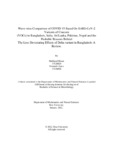Wave-wise comparison of COVID 19 based on SARS-CoV-2 Variants of Concern (VOCs) in Bangladesh, India, Sri Lanka, Pakistan, Nepal and the probable reasons behind the less devastating effects of Delta variant in Bangladesh: a review
Abstract
Background: The world is currently facing the devastating effects of COVID-19. Increasing spread of SARS-CoV-2 Variants of Concern (VOCs) has an impactful effect on different waves of this pandemic. Every country tried to tackle the pandemic by administering COVID specific vaccines. In this scoping review, we aimed to find out the association between SARS-CoV-2 Variants of Concern (VOCs), vaccination and waves in Bangladesh, India, Sri Lanka, Pakistan and Nepal along with the possible reasons behind the less severe effects of Delta variant in some of the countries. Knowledge Gap: Although there are many studies emphasizing on effects of different Variants of Concern (VOCs), vaccinations and country specific pandemic patterns, there is shortage of information regarding the direct association of VOCs contributing to waves of the pandemic in our selected countries. Therefore, we tried to highlight on the infectivity patterns of the VOCs which resulted in different waves of the pandemic in the mentioned countries. Methods: We used two electronic search engines (PubMed and Scopus) and one database (Google Scholar) for collecting articles published between December 2020 to November 2021 which highlighted on SARS-CoV-2 VOCs and waves in our desired countries. Besides, we also included some grey data from some websites and databases (World Health Organizations and Ministry of Health, Sri Lanka). After collecting data based on selected parameters, we created wave-wise graphs based on confirmed cases, death rate and vaccinations for our selected countries along with summary table highlighting effects of different VOCs in our selected countries during those time periods. Result: After analysis of the data based on different waves (Confirmed cases, death rate, variant wise infectivity at a particular time period), we came to a conclusion that, the less severe effects of Delta variant in Bangladesh and Pakistan is due to high prevalence of beta variant before the spread of Delta variant. Although immunization by vaccination aids to reduce the effects of the virus, in our selected countries the vaccination campaign did not contribute much to the dynamics of the pandemic till October 2021. Conclusion: Variant specific analysis of the pandemic is important for proper identification of causes behind the waves. The casualties of the pandemic can be mitigated if proper identification of different VOCs is performed before mass spread. Therefore, for containment of the pandemic in the future, the relevant authorities can emphasize on steps such as genetic screening when a new variant emerges. Besides, the vaccination facility must be accessible to a large proportion of the population in order to ensure community level protection.

